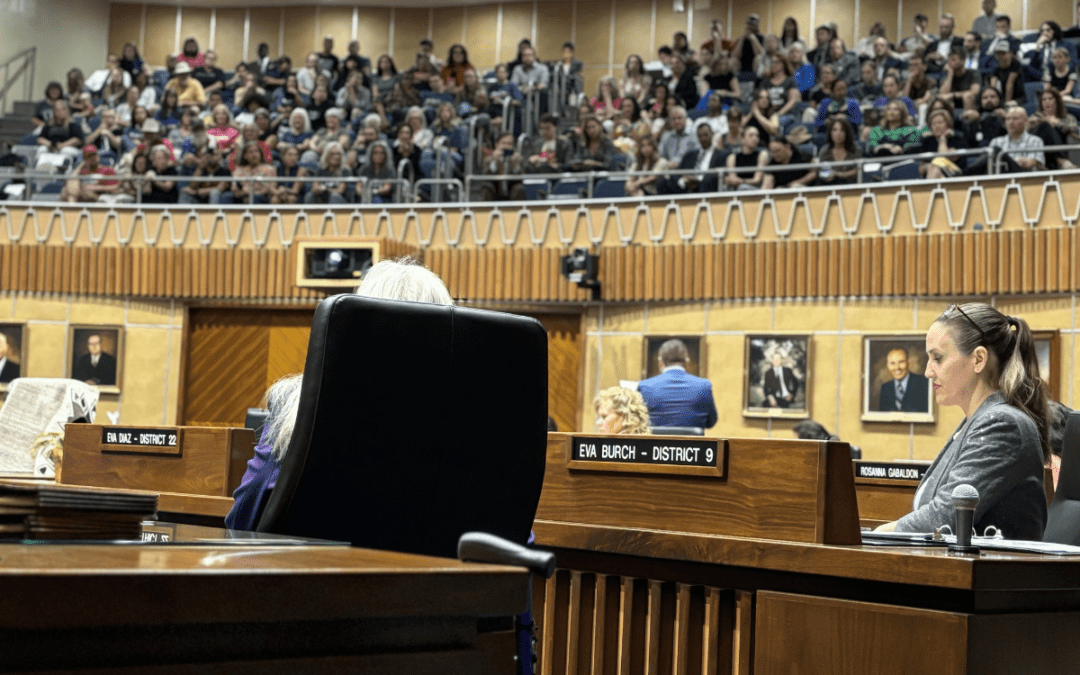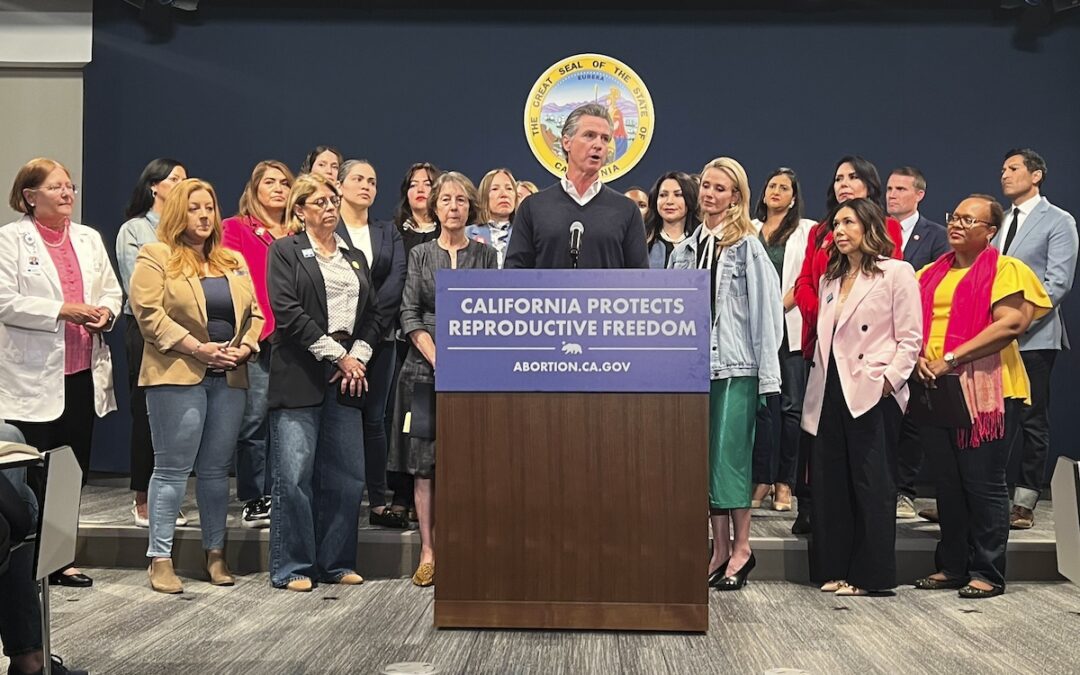
LUKEVILLE, ARIZONA - DECEMBER 07: Immigrants are photographed at a U.S. Border Patrol processing center after they crossed the U.S.-Mexico border on December 07, 2023 in Lukeville, Arizona. A surge of immigrants illegally passing through openings cut by smugglers into the border wall has overwhelmed U.S. immigration authorities, causing them to shut down several international ports of entry so that officers can help process the new arrivals. (Photo by John Moore/Getty Images)
Nearly 15 years after Arizona drew international condemnation for its controversial—and ultimately illegal—“show me your papers” law, the Arizona Legislature this week advanced a slate of anti-immigration legislation that threatens to go even further.
The Republican-sponsored House Bill 2748, Senate Bill 1231, and House Concurrent Resolution 2060 passed along party lines Wednesday, with every Republican voting for the legislation and every Democrat against. The trio has been dubbed, “SB 1070: 2.0,” after the 2010 law passed in Arizona that, among other things, allowed law enforcement to ask anyone for proof of citizenship if the officer suspected they were undocumented. This provision in the law was determined to be a form of racial profiling, and was struck down by the US Supreme Court.
“Championing divisive—and racist—legislation, the sponsors deepen division, an environment of fear and discrimination while legalizing racial profiling,” said Alejandra Gomez, executive director of Living United for Change in Arizona. “This SB1070 2.0 package does little to nothing to address the humanitarian crisis at the border.”
If the proposals become law, they would:
- Give local law enforcement authority to detain and arrest immigrants.
- Grant law enforcement blanket immunity while enforcing immigration laws, removing any form of accountability for potential misconduct.
- Restrict aid for refugees and asylum seekers fleeing violence and persecution.
- Make entering the US outside a port of entry a state crime.
- Give local judges authority in immigration cases.
- Reduce the number of jobs available for undocumented workers.
- Require citizenship verification for public benefit applications and licensing.
What happens next
The two bills are focused on harsher border penalties and would empower law enforcement in a similar way to SB 1070. Next, each bill will be debated over and voted on in the legislative chamber opposite of where it was introduced. Should the bills be approved in the second chamber, they will then be sent to Gov. Katie Hobbs.
Hobbs, who has called for a solution to secure the border while providing necessary humanitarian aid to those in need, told the Arizona Capitol Times that she plans to veto SB 1232—and by extension, HB 2748, since the bills mirror each other—should the legislature send it to her.
“SB 1231 is unconstitutional, will not secure the border, and will drive away businesses and jobs from Arizona,” said Christian Slater, a spokesperson for the governor’s office. “She will not sign it.”
But Democrats close to the governor have expressed frustration at how little Hobbs has spoken publicly about the measure, and believe if she did, it would embolden the business community and others who privately oppose the bill to follow her lead and speak publicly as well. They think she’s worried about political blowback and being characterized as weak on border issues if she did so. Those who spoke with The Copper Courier about this did so under the condition of anonymity, so as not to disrupt the negotiations of ongoing legislation.
Should either bill become law, legal action is almost certain to follow. The legislation could prompt lawsuits alleging racial profiling, as SB 1070 did. The lawsuits that eventually overturned that law were filed before it could ever be enforced, and it cost the state at least $1.4 million to defend in court.
The federal government could also step in, as the law calls for state law enforcement to overstep into federal jurisdiction. A similar scenario recently unfolded in Texas over border enforcement, where the US Supreme Court sided with the Biden administration over the state of Texas.
The concurrent resolution—which would restrict the employment options for undocumented workers—will be added to the ballot in November, where voters will decide whether or not it becomes law.
Public input minimal
All three proposals were rushed through the legislative process; the bills were heard in one committee meeting each, and the resolution was in two, all within the span of less than two weeks. During public comment of HCR 2060, Rep. Rachel Jones, R-Tucson, only allowed three of the 10 individuals opposing the resolution to speak—and cut off the testimony of one of them because she disagreed with their statement.
The resolution has been championed by House Speaker Ben Toma (R-Glendale) who has characterized it as a way to deter undocumented immigrants from living in Arizona. Toma has also used the proposal as a fundraising tool for his campaign for US Congress, despite denying that he would use the legislation to raise money.
“Our message to illegal immigrants is simple,” Toma said. “If you want to take advantage of Americans, go somewhere else.”
Historically, however, it has been undocumented workers who are routinely taken advantage of. They pay taxes, yet are ineligible for many of the social programs they pay into. Studies dating back over 30 years have also detailed how undocumented migrants are victims of wage theft, are paid less, and are provided fewer protections than what the law requires.
Politics

Democrats successfully force vote on repealing 1864 abortion ban, passes House
The Arizona legislature moved forward two bills Wednesday that would repeal the state’s 1864 abortion ban. A bill to repeal the ban has been...

State Official: 1864 abortion ban gives Arizona ‘black eye’
Arizona’s role at the forefront of the climate crisis, defending democratic elections, and protecting reproductive rights has caught the attention...
Local News

Arizona Sens. Anthony Kern, Jake Hoffman, indicted for fake election scheme
Eighteen individuals involved in a conspiracy to overturn Arizona’s election results in 2020 were indicted by a grand jury Wednesday and charged...

Gov. Gavin Newsom wants to let Arizona doctors provide abortions in California
California law generally allows abortion up to the point of fetal viability, which is around 24 weeks. SACRAMENTO, Calif. (AP) — Arizona doctors...





